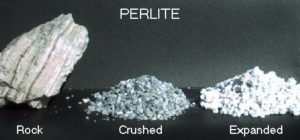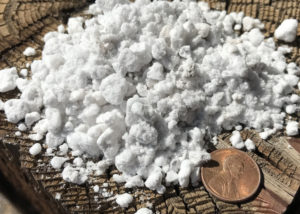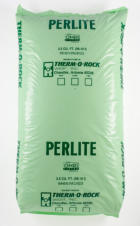
Perlite is an amorphous volcanic glass that has a relatively high water content, typically formed by the hydration of obsidian. It occurs naturally and has the unusual property of greatly expanding when heated sufficiently. In horticulture, perlite can be used as a soil amendment or alone as a medium for hydroponics or for starting cuttings.
Drainage: Perlite is a natural filtration system, allowing excess water to easily drain away while retaining a little moisture and catching nutrients that plants need to grow. This is especially true in raised beds and container gardens, but also in the ground as well.
Airflow: The soil is greatly improved in a bed amended with perlite, and that’s necessary both for your plant’s roots to breathe and for any worms, beneficial nematodes, and other good natural garden inhabitants. Because it’s a mineral glass and thus harder than the soil around it, it also helps to slow down compaction, and keeps your soil fluffy and lightweight.
Perlite has a pH of 6.6 to 7.5, inorganic, inert and sterile. Free from disease, weeds and insects, is light-weight and non-toxic.
The typical chemical composition of perlite varies slightly, as most volcanic glass does. However, perlite which is optimal for the expanding process typically consists of 70-75% silicon dioxide. Other chemicals include:
aluminum oxide (12-15%)
sodium oxide (3-4%)
potassium oxide (3-5%)
iron oxide (0.5-2%)
magnesium oxide (0.2-0.7%)
and calcium oxide (0.5-1.5%)
All of these are natural minerals, and are often part of other soil blends.


Perlite for horticultural growers is sold in a large 6 cubic foot plastic bag in a medium grade 3/8″ -minus with fines.

